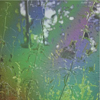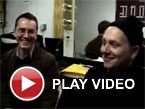Mark McGuire, "Get Lost"
 It is easy (and not unreasonable) to critique Mark McGuire's voluminous solo output as excessive and somewhat redundant–no one needs every single album he releases.  However, it is worth noting that he has maintained a remarkably high (and still seemingly increasing) level of quality for an artist with over three dozens releases to his name and his "major" releases (like this one) tend to be especially good.  Get Lost explores a lot of ground that McGuire has already covered many times before, but he is still covering it beautifully and even exhibits some welcome signs of evolution.
It is easy (and not unreasonable) to critique Mark McGuire's voluminous solo output as excessive and somewhat redundant–no one needs every single album he releases.  However, it is worth noting that he has maintained a remarkably high (and still seemingly increasing) level of quality for an artist with over three dozens releases to his name and his "major" releases (like this one) tend to be especially good.  Get Lost explores a lot of ground that McGuire has already covered many times before, but he is still covering it beautifully and even exhibits some welcome signs of evolution.
It recently occurred to me that the single most impressive thing about Mark McGuire's music is how gloriously and improbably anachronistic it is.  While he has certainly carved out a very unique style that sets him far apart from every other guitarist in the underground milieu, his larger accomplishment is the fact that he sounds like he is recording in a fictitious, sun-dappled Van Halen-imagined '80s while still seeming informed of all post-grunge developments in music.  For example, several songs here ("Get Lost," in particular) evoke vague and idyllic concepts like "childhood" and "California."  Also noteworthy is the fact that Mark has no reservations about sounding upbeat and anthemic (not at all the norm in current psych/experimental circles) and championing unhip metal/prog tropes like harmonized guitar solos without the slightest trace of winking irony.  Given that he is from the Midwest and is too young to remember the '80s, his guileless channeling of innocence, blue skies, and beaches is both unsettling (in a "Faustian pact" way) and hugely refreshing.
Mark evokes some other moods on Get Lost too though.  The most unexpected curveball is his addition of somnambulant, chant-like vocals to the bitter-sweetly jangling "Alma" and its electronically gurgling reprise.  It isn't nearly as major a development as it could have been, as it is more of a textural move than a songwriting sea change, but it is odd to hear a human voice on a Mark McGuire record (especially a seemingly world-weary one).
McGuire also gives electronics an increased role, most conspicuously on the album's epic 20-minute centerpiece, "Firefly Constellations," which is largely built upon a bed of burbling and queasily glistening analog synth (or something that sounds a hell of a lot like it).  In fact, "Firefly" differs dramatically from the rest of the album in an arguably bad way:  most of it sounds far more like a forgettable Kosmiche artifact from the '70s than something distinctly McGuire-esque.  Also, it seems a bit annoying, static, and overlong...until it morphs into a rather sublime outro around the 13-minute mark.  I am still on the fence about whether the pay-off needs or justifies such a sluggish build-up, but it is impressive enough to elevate the song from "bad idea" to "somewhat successful experiment that may continue to grow on me."
Successful or otherwise, it is definitely heartening to hear McGuire publicly wrestling with new ways to expend his aesthetic, as those quirks and detours make Get Lost stand out a bit from the rest of his vast oeuvre and bode well for his continued relevance.  At this point, it is pretty much a foregone conclusion that a new McGuire album will be quite good (as this one is), but a bit more unpredictability sweetens the deal immeasurably.
Samples:
 



